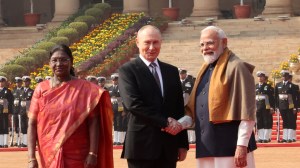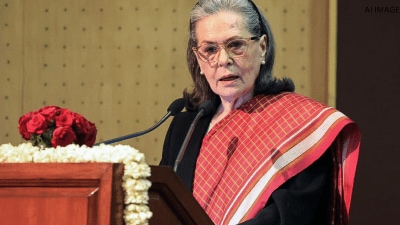In the wake of a series of terror attacks in the Jammu region, including on a bus carrying pilgrims near Reasi, Prime Minister Narendra Modi, who chaired a meeting Thursday to review the situation in J&K, directed the “deployment of the full spectrum” of “counter-terror capabilities”.

National Security Advisor Ajit Doval and other senior officials were present at the meeting, sources said.
The Prime Minister, sources said, was given an overview of the security-related situation in J&K and was apprised of the counter-terror efforts being undertaken in the region.
He was also briefed on efforts by the local administration to counter such incidents in future.
Modi, sources said, “sought deployment of the full spectrum of our counter-terror capabilities”.
The review meeting comes in the wake of a series of attacks in J&K.
Story continues below this ad
Last Sunday, nine pilgrims were killed and 33 injured when a bus carrying pilgrims was attacked in Reasi.
Since Tuesday, a CRPF jawan and two militants have been killed and 7 security personnel injured in three separate encounters in Doda and Kathua districts.
An M4 carbine, an AK-47 rifle, six live grenades, bullets, food and medicines with Pakistan markings, and Rs 2 lakh in Indian currency were recovered during the encounters.
News agency PTI reported that about 50 people have been detained in connection with the Reasi attack and the search has been expanded to include far-flung areas like Arnas and Mahore.
Story continues below this ad
Last month, an IAF convoy was attacked near Shahsitar in Poonch district, killing one personnel and leaving four others injured.
In April, a 40-year-old villager was killed after militants opened fire on him near Shahdra Sharief area of Thanamandi. In the same month, a village defence guard, Mohd Sharief, was killed in Basantgarh area of Udhampur.
Over the last three years, areas south of the Pir Panjal range have seen a spike in terror incidents.
In Rajouri and Poonch districts, 38 soldiers and 11 civilians have been killed in terror attacks since 2021.
Story continues below this ad
While the Army and the security forces have an established counter-infiltration and counter-terrorism grid in place along the Line of Control and the hinterland of J&K, various geographical and terrain challenges make it difficult to plug all gaps along the LoC and fullproof it from infiltration, particularly well-trained and highly-motivated militants who keep changing their tactics.
Moreover, areas to the south of Pir Panjal can be accessed through easier and all-weather infiltration routes. But since they lack adequate logistical support there, the infiltrators not only target security forces but also civilians.
Other factors such as two main roads passing through this region — the Jammu-Srinagar highway and the old Mughal Road connecting Poonch and Shopian in the Valley via the Pir Panjal Pass — the demographic constitution and the geographical lay of the land, characterised by forested hills of lower altitude, are reasons why these areas have often been targeted by militants.
There’s a pattern: a group of 10-12 trained militants spread out in sub groups in the Rajouri-Poonch sector where they carry intensive reconnaissance and take advantage of any vulnerability noticed in the CT grid.
Story continues below this ad
According to an official, the fact that the terrorists have been able to remain undetected and avoid any kind of contact in the last 7-8 months indicates a lack of actionable intelligence on their presence or the mode of their infiltration and replenishment while they are there.
Senior defence and security officials had earlier told The Indian Express that lack of adequate actionable intelligence on infiltration of terrorists and their sustenance, thinning of security forces from the hinterland and an increasing influx of narcotics are among reasons why Poonch, Rajouri and Jammu have been seeing several high intensity terror attacks.









